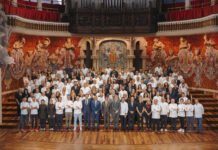Daytime TV Star Thaao Penghlis Seducing Celebrities wants to Give You a Taste at his next dinner party. Read all about it in his new book.
Thaao Penghlis has starred in some of the biggest TV shows of all time – including playing on daytime TV’s “Days of Our Lives”.
Thaao Penghlis new book Seducing Celebrities: One Meal at a Time
Now in Thaao’s new book, Seducing Celebrities: One Meal at a Time he reveals seduction in the dining room by creating incredibly delicious for his famous friends.
Today’s conversation has been edited for length and clarity. For the full, un-edited conversation, visit our YouTube channel here.
Joe Winger
Congratulations on your new book. It’s a tasty read and a fast read.
Thank you for joining us for a conversation today.
Thaao Penghlis:
Thank you for inviting me.
Joe Winger:
You’ve done a lot of work in your life. We’re going to go to food and books as quickly as possible.
When you’re at an airport or in public, what is the most common thing people remember you from?
Thaao Penghlis:
Certainly Days [of our Lives]. There’s a big Armenian contingency out there who always comes at me at the airports, [Days…] was in 152 markets. Especially when you’re in New York and it’s an international port. When Mission [Impossible] was on. I certainly enjoyed that. I think it had a large male audience because of the action and that I liked it was interesting. That kind of prepared me for the masks that I did on Days [of Our Lives]. So it was a real challenge. Working in daytime; I think the biggest challenge is remembering all those lines and giving it some kind of conviction and taking those lines off the page.
And a lot of the time, because there’s too many lines, we’re just on the edge, and so because I have a certain intensity I’m able to cover. I think through all those years people, airports probably are the biggest. I’m going to do a PA [public appearance] at the Grand Canyon in August.
It’s a very special train ride through the Grand Canyon with just 22 fans. It’s going to be a very intimate affair. So over the years, you get the older people who are the real followers, because the youth today have different appetites.
Just like they do with food, they’re not always conscious about what they’re eating. Unless they’re educated about it or they’re raised on good food. And I think today food has become a convenience rather than a celebration.
Joe Winger:
You use wonderful words in your book. It feels almost like poetry. “Food is the magic of our universe.” Can you elaborate on that a little bit?
Thaao Penghlis:
We’ve been given such diversity as far as food is concerned, that we have that many choices, especially in countries that can afford food. But to me, once you’ve grown up tasting octopus – we used to hang it on the [clothes] line for three weeks until it dried out. There’s no blood in the octopus, therefore, it doesn’t rot – that was mouthwatering.
Some of the fruits you have in life, like mangos. When you can appreciate the way they’re being served. It’s not like eating an apple. If you eat a mango and you slice it, then cut it up in quarters, there’s a different texture to it. The flavor. To the eye it becomes attractive. I think food, when you think about what you can control in your life and you are blessed to have it. I think food is magical because of that.
Joe Winger:
One more line of food poetry from your book. “You discover your body’s secrets by the way you feed it and how it feeds you back. “
Thaao Penghlis:
When we who are in the Greek Orthodox church, we go through a fast to the last day [of holidays like Easter] before we go to the church and get the bread and the wine.
You start to appreciate the food that you can’t have because of its limitations in the religion. The last day you’ll have olive oil on bread with some sugar, things like that. So when you get to food and understand it, when you stop eating and cleanse your body, sometimes it just juices, you become hungry.
You get to understand what food does to the body by emptying it out. If you don’t eat well, or if you eat late, then the next day, you’re not going to feel great.
So you get to understand what the body can take and what, and when, are the limitations to eating and at what hour, if you drink too much wine.
As an actor, I don’t drink very much. But if I have wine, the next day, my eyes are going to show it. So it tells me something about the kidneys, because the eyes are connected to the kidneys. So it’s understanding how the machine you’ve brought into life carries your soul. How does that express itself in the best way possible?
As actors, we have a responsibility because of that body being presented on camera as a certain responsibility to the producers to the show and to your audience. So you get to understand. I would go through a four day fast with Bela’s broth, Celsius broth. I would find that would cleanse me through the days I did like a liver cleanse, which got rid of stones.
You get to understand what the organs are, that you can do things naturally without having to take all those dreadful medicines and those pills.
The body is all we’ve got. Why have I overcome certain things in my life? It’s always been through nutrition.
Joe Winger:
Your journey, the things you’ve learned, and you touch upon that in the book a little bit, lessons you learn from different actors and producers and people you’ve worked with, but that’s another great lesson is as far as using it as a medicine.
The book is called Seducing Celebrities: One Meal at a Time. It is an enormous undertaking: beautiful pictures, recipes, Hollywood stories, your family. There’s a lot going on.
What inspired you to write the book?
Thaao Penghlis:
The hardcover has all the colored pictures inside. So it has a different dimension to it when you actually see it, because let’s face it, presentation is very important.
So when you see color, when you see something displayed you want to get into it. If something looks like someone just piled something, it’s not attractive to the appetite.
My manager called me one day and he said, “You always talk about food. Why don’t you do a cookbook?”
I went, “Oh, I don’t know how to do a cookbook. Everything that I’ve caught has come out of my head.”
I remembered, I learned when I worked at the UN [United Nations] for a year when I was in the diplomatic corps. In my youth I went into kitchens where they had chefs. I saw presentation. I understood the etiquette of arriving there on time.
45 minutes later you’re having the hors d’oeuvres, maybe it’s champagne, maybe it’s some caviar or whatever they presented.
Then it was time to go into the dining room and sit there. It became a ritual. And so you got to appreciate the time, the presentation that someone put in.
So all these memories came into my head. I said how would you think? How do you think about food? I said it’s really seducing people, isn’t it?
By the way you create an atmosphere, by the way you look at a dish, and by the aroma. So I said, Let’s call it “Seducing.”
I said who have I seduced?
How about celebrities that I’ve met and worked with? That’s how it came about seducing celebrities. One meal at a time.
I always like to serve the first, second and the third course. But usually, I don’t join the guests on the first course, because I’m busy preparing the main course.
So I present the first course to them. Then I’m in the kitchen. The actor, Danny Kaye in the old days. He used to be an expert of Chinese food and around the counter in his kitchen is where his friends sat and he just fed them. That was something that was so gratifying for him.
So I understand if it’s done well, and your friends leave. They take it for granted.
People don’t cook these days, or they’re intimidated because of the way you’ve presented it. So therefore let’s take you out instead. So you don’t get that personal touch that I think is so important.
When you sit around your watering hole, as I call it, that “table”, which is something if when I leave this country eventually and go home to Australia, that is one thing I’m going to take with me is that table because it has a huge history to it.
To me the table and how you decorate it and how you present it is very important to the appetite of the person joining you.
Joe Winger:
I’m thinking of your table, sometime in the future when you do move, that could be a heck of an auction item. The amount of people who sat around it and heard stories and shared stories.
Speaking of those stories, you’ve named huge Hollywood stars like Tom Hanks, Rita Wilson George Clooney, amazing actors, Joanna Cassidy, William Hurt.
Your Hollywood life has been so many decades of work and amazing people. What was the process like deciding who makes it into the book and deciding who you had to leave out?
Thaao Penghlis:
You don’t like everybody you’ve worked with and everybody you’ve met, food is very personal
In the old days they serve you poison. In the French 18th century, you’d be sitting there and if you were an enemy, they’d serve you a dish with poison. That’s how they got rid of enemies. But I don’t know.
Dame Edna, who I was best man at his wedding, which is Barry Humphries. He was very particular. He was also a person who loved art. So he would walk around my house looking at what kind of a collection and made his judgment on it.
The same thing with the food, he would taste it. He would give you that quite qualifying look that he approves.
Omar Sharif was different. When I worked with him, we had champagne and caviar every day, because that’s the way he lived.
[He would be] telling me stories of Lawrence of Arabia and many of his other films and I think, because I look like his son, he was very taken not in the beginning. In the beginning, he was quite rude and quite distant. It wasn’t until I was about to start the first scene with him where he comes into the room and when I met him, he was distant, shook my hand and said, “Hello”.
So when he comes into the room, he’s supposed to slug me after something I say.
He says to me, by the way, “Please, when I hit you do not go over this 18th century table and break it. It’s very important that we are respectful about this table.”
And I said, Oh, I’m not going anywhere. And he says, what do you mean?
I said, “Oh, Omar. I said, if you hit me and I go flying off that table, where do you and I go for the next four hours?”
He says “What will you do?
I said, “I’ll probably adjust my tie.”
He started to laugh and that’s how it started.
How do you infiltrate a person’s personality who comes in defensive working with Bill Hurt in “Altered States”.
I had some very difficult dialogue because it was very technical. How do you make it real? I started to do this sequence and he says to me, “Is that how you’re going to do it?
And I said, “Why is that how you’re going to do it?”
And from that moment, he goes, “You’re an arrogant son of a…,”
And I said, “So are you.”
From that moment, we clicked. When we joined hands in Mexico, away from Warner Brothers, we had a good bond.
I never stood for his star attitude. You have to call it. So I don’t like it. When someone brings that, I leave that, I go outside.
Joe Winger:
Doris Roberts, after dinner once wrote you a note. I took that idea as an incredibly loving gesture.
if you could talk a little bit about that note, and then any other amazing gifts from you dinner parties?
Thaao Penghlis:
When I approached Doris and she would write the introduction, her comment was, “Oh, darling, why don’t you do that?”
I said, Doris, you’ve been coming here for dinner for years. So why can’t you just get in touch with your heart and write something pleasant?
And that’s what she wrote.
Because every time she came, it’s like my friends who come over always know they’re going to get a good meal. I never go cheap on the thing. I’ve seen people come in the house with daisies in their hand. I said, “Does this house look like it collects daisies?”
Or they’ll bring me Two Buck Chuck.
I said, are you bringing that so I can put it as a wine for the food, because it’s certainly not going on the table and things like that.
Where people are not experiencing you or contributing and also shows you how cheap it is. And even when Doris, who used to get crates of champagne from Dom Perignon for free, because she was connected to somebody who worked there, she would come in.
She would say “Darling, here’s some Dom Perignon, put it in the fridge.”
I said, “Oh, okay. Thank you.” I think, Oh, this is a person who understands quality.
Then five minutes later, she’s sitting at a chair. She says open the champagne for me, will ya?. So I realized it wasn’t for the house. It was for her. So she didn’t bring anything.
Here’s this woman who makes an enormous amount of money. I’ve studied with her for over 20 years with Katsalis, the director, and then she would come in and sit at the table and she would look at the flowers and then she would look at the presentation of everything and then she would smell the food and so through that experience – you don’t always get respect, you have to earn it.
With her, because of my work as an actor, and because of my success as an actor, and also now writing some people will say to you, “Are you writing another book?
But they say it in such a derogatory way.
Whereas Doris said, “I’m so proud of you.“
I went out with Doris, just the two of us went to movies because she always had to have company. She was like Joan Rivers. She had to have every night filled. She couldn’t stand just being on her own. So when she was invited to my home, she always remembered the presentation and the flavors of that evening.
Joe Winger:
Let’s talk a little bit about what was the process of writing the book like this time?
Thaao Penghlis:
Recipes are in my head.
So I had to cook in my head. For six months I started to think, Oh,I never wrote anything down.
I would call friends and say, “What was your favorite meal I cooked?”
Then I would say, Oh, okay, that’s good; and then I would just test my friends and they would tell me what they like the best.
So I got all these recipes that were still in my head. And I somehow remember what I put in it. My sister in law in Australia says to me, the difference between you and I as chefs is that I have to have a cookbook in front of me. You open the fridge and say, what are we going to eat?
I spent six months going through recipes.
Then finally I said, what did my mother cook? The Greek traditional foods or the Greek desserts. And my sisters are very good at cooking desserts.
Then slowly I collected the foods and started to make them.
Joe Winger:
That’s an incredible journey.
We’ve pushed toward the idea of an impolite or a bad dinner guest. How do we find an appropriate dinner gift? And then what would be a definite no?
Thaao Penghlis:
People will ask me, what can we bring?
It’s a silly question because you can’t bring food. So you, what do you bring wine? Or flowers? Or whatever enhances the atmosphere?
But something that’s not here, but sometimes when they keep asking me that, I say, bring cash. And that always throws them because they take it seriously.
So sometimes I won’t answer that question. I said, “Surprise me. But make it expensive.”
So I like to play with them.
I said to a friend of mine once, your hands are always empty. They never spoke to me for three years after that. They turned around and left.
There’d been guests who arrived when you had a seven o’clock dinner and arrived at 9:30. I’ll open the door and say to them, “I’m sorry, we’ve already had dinner. We’ll talk another time.” And then I closed the door because I find it disrespectful.
It tells you who people are and their consciousness. I don’t like unconscious people, but we’re going through a very difficult time in the world.
And it’s all because people are not conscious of others. It’s always about them. And so to me, the wonderful thing about serving food and expecting something in return, something.
Even if it’s – we used to write notes in the old days, a phone call – but texts now have become such a convenience.
Why don’t you just call me and tell me where I spent two days preparing this, that you can’t afford a five minute phone call, but you’ll text me in one sentence and that’s it.
Things like that I don’t approve of.
I think that kind of communication short changes [the memory of the experience]. I want to be at times where you want to cook again. If you’re not gonna share something about yourselves, call me the next day and say, I had such a wonderful evening. Some people think it’s enough when they leave, or they got here,
But they don’t understand how you complete things. Completion is very important. Just as an actor, you have an arc in your character, it’s complete.
The same thing with food.
When I serve food, it’s complete. I have an order: I have hors d’oeuvres. I have a first course. I have the main course. And then I have dessert and maybe some Greek coffee or tea or whatever people need and the wines.
But I just find people are unbelievable. They don’t understand what it takes to put an evening together.
If you don’t know how to treat me, I’m going to show you. So that’s what I said there.
Joe Winger:
Have you ever played with the idea of a cooking show? Is that something you see at all for yourself?
Thaao Penghlis:
It’s a lot of work. All that preparation. I’ve done it as a guest here and there.
Joan Rivers used to join guests and everything, she always made some wonderful jokes.
Dame Edna would make wonderful jokes.
I’m doing a book signing May 22nd at the Grove in Los Angeles at a Barnes and Noble. I’ve got to do a cooking show. I thought what are we going to cook? Something that’s not difficult.
So I’m going to do a vegetarian dish, which is not in the book, but it’s with shiitake mushroom, truffle oils, mint, basil heirloom tomato, raw peas and pine nuts. Then I will mix that in with the pasta and some olive oil and then some truffle oil and with some herbs and that’s about it.
That’s so convenient and it’s such a delicious dish with Parmesan cheese over it.
Joe Winger:
The book is called Seducing Celebrities: One meal at a time
You breezed over Joan Rivers for a moment and I wanted to touch upon it because In that chapter, you help us see her in a different way than what we always think of her as, especially being in the car with her daughter, Melissa as a young girl.
When I think of Joan Rivers, the stereotype, I think of outrageous, and you have one or two moments beyond her, Barbra Streisand, there’s a little bit of outrageousness there, are there any outrageous moments that you didn’t include that you thought about including?
Thaao Penghlis:
I don’t I don’t mind telling stories, or privately telling stories.
There’s got to be a borderline, just like etiquette. If I’m expecting for people to behave a certain way.
One time, there was a famous guest, which I won’t mention, who was having problems with their daughter, and they were sitting around the table. The phone rang in the middle of dinner, and he answered it, he starts screaming on the phone, and telling his daughter off.
I just lost it, I got up and I said, “If you don’t mind, take your bloody phone call outside, we’re not interested in your private business and how rude of you.”
Because I don’t like people bringing phones into the house.
The inner chatter that goes on with people’s minds, where they’re so distracted with life instead of just being there. Being present.
With Telly Savalas as well. There have been times also with people with Days [of Our Lives] and I couldn’t tell those stories because firstly, I have to work with him again. Secondly, I don’t think it’s everybody’s business.
There was a book that Hustler put out all the stories about those magnificent stars of the [1940s] and talked about their sexual proclivities.
Someone said, “Why would you do that?” Why would you betray your friends that way?
You smash the myth. They spent years creating a myth. But when you start getting into the nitty gritty, you make those people ordinary. And show business is not about being ordinary.
So I try to refrain from telling things that go beyond the norm. I want to be able to see these people later in some time, even though they’re gone,
I still believe we’ll see them on the other side that they did more good for me. Otherwise it’s a matter of respect and keeping someone’s dignity there.
Joe Winger:
Your book starts almost like a love note or a Valentine to growing up with your family. Your mother, your father, their first trip to L. A., to your grandfather George’s herrings and olive oil tin.
Thaao Penghlis:
Yeah, that was something to watch growing up.
To see my grandfather bringing his knowledge of food from the islands of Greece.
What I remember the most, even my grandmother, you’ve come down in the mornings and you can smell the cinnamon toast. She would be dipping wicks into wax and creating candles for the church.
Joe Winger:
Seducing celebrities one meal at a time.
Can you give us a tease about what you’re looking forward to in the future?
Thaao Penghlis:
I just finished exploring the Holy Families.
I did a two week trek up and down the Nile to these sacred places. So I’ve written a story because most of the things we see about religion are postcards or lovely paintings. What do we do when we explore it within ourselves and follow those routes? Something else happened.
I’ve written a teleplay. It’s very interesting the way it begins and where it begins and how it follows through into The Great Escape.
Find Thaao Penghlis’ new book on Amazon at Seducing Celebrities: One Meal at a Time






























